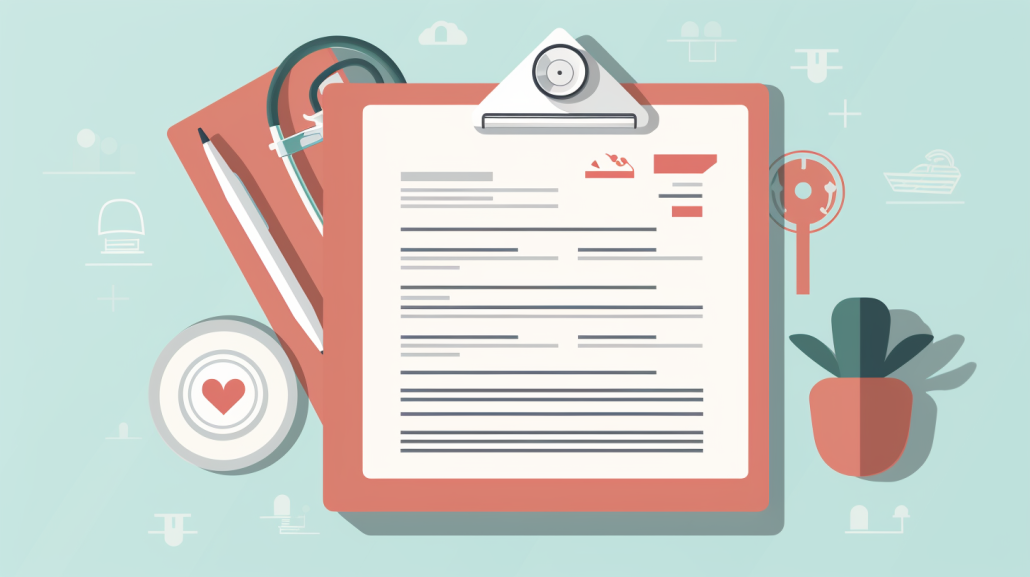Tips To Budget For Healthcare Expenses

No doubt, budgeting for healthcare can often feel like tackling a giant puzzle where the pieces keep changing shapes. You’re not alone; many of us have been in that same boat, steering through nebulous waters of unknown expenses.
Good news is, armed with personal wisdom and extensive research, I discovered it’s quite navigable than it appears initially. So here we are! This blog post will serve as your compass navigating those tricky healthcare costs and supplying you with practical tips to set an effective financial course around them.
Ready to sail? Let’s embark on this journey towards healthy living without causing havoc in our wallets!
Key Takeaways
- Understand all healthcare costs. This includes health insurance, routine care, and emergency costs.
- Start with identifying necessary expenses to create an annual budget for healthcare.
- Use ways like visiting in – network doctors or making a Health Savings Account to reduce costs.
- Live healthy and get regular check – ups to prevent costly health problems.
Understanding Healthcare Expenses

Grasping healthcare expenses is the first step towards satisfactory budgeting. There’s your health insurance that includes aspects like monthly premiums, deductibles, and co-pays. But beyond insurance, routine costs such as check-ups, over-the-counter drugs, and any necessary medical equipment enter the equation too.
Emergency medical costs can sneak up on you; an accident or sudden illness can lead to hefty treatment charges overnight. To better manage your finances and handle unexpected blows with grace, it’s essential we break down these components together in this journey to understand healthcare expenses better.
Health Insurance

Health insurance is a big part of healthcare costs. We all need it to cover some of our bills when we get sick or hurt. You pay for health insurance every month, even if you do not go to the doctor or use any services.
This is your monthly premium. Higher premiums often mean lower out-of-pocket costs later if you need care. Health insurance also has a thing called a deductible, which is the amount you must spend on your own before the company starts helping with costs.
Some plans have co-pays, where you shell out a set sum for each visit or prescription along with what they offer to pay too, this depends on your plan’s details.
Routine Healthcare Costs
Routine healthcare costs can make up a big part of your budget. These are things you need all the time, like over-the-counter drugs, eyeglasses and medical equipment. It also includes hearing aids if your doctor said you need them.
To keep these costs low, check how much you spent in the past year on such items. This will help in knowing what to expect for next year’s expenses. Also, be sure to set some money aside each month for this so it doesn’t become a surprise later on.
Emergency Medical Costs
Emergencies can hit you when you least expect them. Think about auto accidents, urgent health issues or sports injuries needing an emergency room visit. If not prepared, these could leave a big hole in your pocket and lead to medical debts.
That’s why it’s important to budget for sudden healthcare costs like these too! It helps secure your money against crisis scenarios. You never know what tomorrow holds – so keep aside some cash in an ’emergency fund’.
Trust me, this safety net will come handy if any such accident or illness strikes unexpectedly!
How to Budget for Healthcare

Crafting a budget for healthcare can feel daunting, but it’s a necessary step towards financial stability. Begin by pinpointing your required medical expenses – these may include monthly insurance premiums, routine appointments or prescription costs.
Now let’s sketch out an annual healthcare budget; factor in unexpected health care costs like accidents or illnesses might bring along. It is also essential to account for potential rises in the cost of treatment and medications each year.
Building a robust healthcare budget demands proactive money management and foresight about future medical requirements without neglecting other aspects of personal finance like rent, food, vacation etcetera accordingly.
Remember this – knowing where your dollars are going eases stress and makes handling emergencies easier!
Identifying Necessary Expenses
Funding for healthcare needs careful attention. Here is how to mark the necessary expenses:
- Start by looking at health insurance costs. This includes your monthly insurance premiums and deductible.
- Add in co – pay fees you owe each time you see a doctor.
- Remember the out-of-pocket max, it’s the most you have to pay for covered services in a year.
- Co – insurance is also important. It’s your share of the cost of a service after you pay any deductibles.
- Look at routine healthcare costs as well. Over-the-counter drugs and medical equipment should be part of your budget.
- Include sports injuries, auto accidents, emergency surgeries as part of emergency medical costs too.
- Don’t forget vision and dental appointments or E.R visits count.
- Cost-sharing payments like co-payments or coinsurance should not be left out either.
Building an Annual Healthcare Budget
Planning for healthcare is important. It ensures we have money to meet our medical needs. Building an annual healthcare budget is simple if we take the right steps.
- Firstly, know what your health insurance covers. Ask about monthly premiums, co-pays and out-of-pocket max.
- Secondly, be aware of your routine costs. This includes visits to the doctor or over-the-counter drugs.
- Thirdly, set up an emergency fund. You never know when you might fall ill or get into an accident.
- Forever be mindful of variable healthcare costs. These can change each year and can have a big effect on your budget.
- Make sure to set aside at least 5% of your net income for healthcare in your budget every month.
- Lastly, review past expenses thoroughly and use them as a guide for future budgets.
Planning for Rising Healthcare Costs
Health costs can go up over time. It’s good to plan for this in your budget. I put a bit more money aside each year for health care. This helps when prices go up later.
A change in law may affect health costs too. For example, the price of medicines might rise or fall because of new rules made by the government. To make sure you’re ready, look out for news about such changes and adjust your budget as needed.
Tips to Save on Healthcare Expenses

Choosing a suitable health insurance plan, using in-network providers, and setting up Health Savings or Flexible Spending accounts are just the tip of the iceberg to curbing healthcare costs.
Discover more ways you could be saving on your medical expenses by diving deeper into this topic!
Choosing the Right Health Insurance Plan
Picking the best health insurance plan can take time. Here are some steps that can lead the path:
- Look beyond just the monthly insurance premium.
- Pay close attention to other costs. This includes deductibles, co-pay, and co-insurance.
- Think about your out-of-pocket max. This is the most money you would have to pay in a year.
- Check if your favorite doctors are in – network.
- Look at the total cost for the whole year, not just each visit or medicine.
Visiting In-Network Providers
Going to a doctor who is in your health plan’s network can save you money. These doctors have a deal with the insurance company. They offer their services at lower rates. So, when you visit these doctors, you pay less.
You may think that out-of-network care and in-network care are the same. But they are not. Costly bills can surprise you if you get care from an out-of-network provider. Check your plan’s details or ask your insurer before going for any treatment.
Using Direct Primary Care
Direct primary care is a good way to cut healthcare costs. You pay a monthly fee straight to your doctor. The fee covers basic office visits. This means you can see your doctor as often as you need without extra cost or using insurance.
It works great for people with high-deductible health plans after meeting their deductible each year and wanting more time with their doctors, which helps in taking better control of chronic diseases like diabetes or heart issues.
With this, there’s also no worry about copays or big bills for routine check-ups and consultations!
Checking Costs and Negotiating Medical Costs
Before you agree to a medical treatment, find out the cost. This helps avoid surprise bills later on. You can save money by asking for a lower price too. Some places may give discounts if you pay cash upfront.
Ask if cheaper or generic drugs are available instead of brand-name ones. These little steps help keep your healthcare costs low and within your budget.
Setting Up a Health Savings Account (HSA) or Flexible Spending Account (FSA)
I’m putting money into a Health Savings Account (HSA) or Flexible Spending Account (FSA). Here’s how I do it:
- I make sure that I have a valid email address. It should not be more than 100 characters long.
- I enter my email address into the system.
- I click on the link they send to validate my email address.
- In 7 – 10 business days, I receive an email about my account status.
- If there’s a problem, I use a special link to sign up for Viewpoints.
How Can I Adapt Personal Budgeting Strategies for Managing Healthcare Expenses in My Business Budget?
Managing healthcare expenses in a business budget requires adapting personal budgeting strategies. By efficiently allocating funds and prioritizing healthcare costs, you can strike a balance between individual and business needs. Utilizing cost-saving measures, monitoring spending, and exploring healthcare options tailored to your personal vs business budget can help tackle healthcare expenses effectively.
The Importance of Preventive Care and Healthy Lifestyle

Staying healthy is vital. It helps keep health costs low. I try to eat good food and stay active every day. This lowers my risk of health problems later on. Check-ups are a must, too! They catch small issues before they become big ones.
Getting flu shots and vaccines saves money in the long term too! I don’t get hit with high treatment costs if I get sick from these diseases. A walk or bike ride each day lifts my mood and keeps me fit.
It’s an easy way to help prevent serious illnesses like heart disease or diabetes down the line!
Conclusion
![]()
You can plan for healthcare costs like you manage other bills. Spend some time to learn your insurance coverage and make a health budget. Use smart ways to save money on medicine, tests, and doctors.
Keep up with check-ups and live healthy to prevent big health problems later on.
FAQs
1. How do I start budgeting for healthcare costs?
Start your healthcare budget by adding all fixed healthcare costs like insurance coverage, contact lenses, and routine care into your annual budget for other expenses like rent and food.
2. What should I consider when choosing a health insurance plan?
When looking at health insurance plans, note the cost of fixed monthly premiums, look for in-network facilities or doctors and scan through exclusions or benefits included in the Summary of Benefits and Coverage page.
3. Can my employer’s plan help me save money on healthcare costs?
An employer-sponsored health plan can be cheaper than getting your own policy because they often cover more services with reduced paperwork needs.
4. How can I prepare for unexpected medical expenses?
You should create a medical emergency fund as part of planning your budget. This way you have savings that can cover hospital visits if needed without impacting your regular flow of cash especially during retirement age
5. Are there any tools to assist with health insurance budgeting?
Yes! Tools such as those provided by WebMD or Anthem Insurance Companies give insight on how to manage expected annual spending while also teaching about potential fraud prevention measures.
6.What happens if changes happen in my life like starting a family or leaving an employer?
During big life changes such as self-employment or starting family always adjusts overall Health care budgets . It is crucial to stay informed with current legislation surrounding Healthcare which may offer new options such as the affordable care act.






